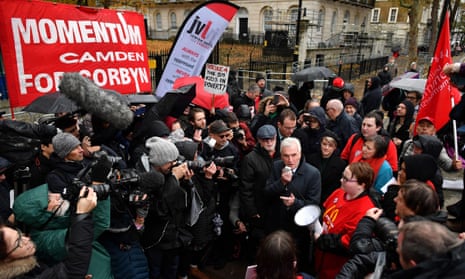Nearly every Jeremy Corbyn speech these days is punctuated by the words “in our society” – a basic indication of what the Labour leader thinks politics ought to be about and the terrain on which he feels most comfortable. And so it goes with Labour’s election campaign. The party’s prospects essentially depend on whether enough people are prepared to put the tortures of Brexit to one side and concentrate on the state of our social fabric.
If they are, Labour has an effective vocabulary to nail Tory failure, as evidenced by the words Corbyn used to launch his election campaign: “If you want to live in a society that works for everybody and not just the billionaires, if you want to save our hospitals, schools and public services from Tory cuts and privatisation, if you want to stop the big polluters destroying our environment, then this election is your chance to vote for it.” However bad his personal ratings, the potency of his moral kind of politics endures: on Tuesday, when he debates with Boris Johnson on ITV, it will be by far his strongest suit.
But what to actually do with power, should Labour somehow win it? So far, many of its answers to our social crises seem to lie in the straight-ahead stuff of hugely increased public spending, and sweeping changes that will apparently be delivered by benevolent hands in Westminster and Whitehall. The manifesto will be unveiled this week, but we know already that the party is promising a £26bn boost for the NHS; six years of free study for every adult; a vast expansion of social housing; 1,000 new children’s centres; and the nationalisation of the railways, water companies and energy supply networks, not to mention BT’s broadband division. On and on it goes: one party leaflet served notice of no fewer than 66 policy promises.
A lot of these ideas speak to the plain fact that the public realm desperately needs to be revived and restored, and doing it will take a lot of money. But there are also obvious tensions in the party’s vision of a turbocharged state coming to everyone’s rescue. Among the key lessons of the 20th century was the fact that the public sector is not synonymous with virtue, and state-run monopolies can be just as dysfunctional as private ones. Our centralised system of government is sclerotic, inefficient and far too distant from the society it oversees. Throwing money at it may or may not improve the way it works, but would threaten to leave untouched most of the profound imbalances of power it locks into place.
Out in the country, a kind of practical progressive politics uncoupled from central government is being lived out. Particularly on the left, received opinion might portray Britain as a place divided between a thriving capital and boarded-up wastelands where all hope has died, so that only national politicians and bureaucrats can sort things out. But the reality is often very different.

In Stoke-on-Trent, I have seen grassroots initiatives aimed at tackling holiday hunger and helping children anxious about school; in Walsall, a huge community partnership that delivers everything from play schemes to domestic repairs for people who could otherwise not afford them. In Manchester, a project called Working Well, set up to help people experiencing long-term unemployment, connects with health services, and has twice the success rate of schemes run from Whitehall. Some of this stuff might upset leftwing sensitivities about working beyond the orthodox public sector. But doing determinedly local things outside old orthodoxies creates space for innovation, makes people participants instead of recipients and often succeeds where more traditional approaches fail.
Some Labour people are aware of what this entails. As evidenced by his plans to move parts of the Treasury to the north of England and insistence that 21st-century nationalisation has to be more democratic, John McDonnell seems to have some of the right instincts about the state and how it should work. Among the party’s policy documents is a fascinating paper, From Paternalism to Participation, which McDonnell reportedly enthused about. And among a network of thinktanks and on-the-ground activists there are plenty of conversations about decentralisation; from a generous perspective you can frame some of the party’s big-spending pledges as a recognition that no one can feel empowered without the necessary funds.
But talking to insiders, it does not take long to be reminded that top-down thinking has run deep in the Labour party’s culture for decades, and the question of how it would change the basic institutions of government and the public sector remains largely unanswered. The problem is exacerbated by the people in Corbyn’s circle who seem to cling to a Leninist view that socialism depends on a state whose gigantic size and strength gets things done. Partly for ideological reasons, the party leadership’s relations with many of Labour’s most experienced and influential local government figures are reportedly distant. The unreformed, hierarchical structures of the unions and the party itself hardly help.
Genuinely modern socialism would revolutionise Westminster and Whitehall and disperse their power – and so revive local government, which would be completely transformed. Labour wants to replace the Department for Work and Pensions with a new Department of Social Security: a better ambition would be to scrap a central ministry and hand the running of most benefits to councils. Much the same might apply to the local government department, and the administration of education, health and transport. Taxation could be thoroughly localised. The way places are run could start with something that the burgeoning localist movement, Flatpack Democracy, has made clear: the optimum population size for meaningful grassroots democracy is between 10,000 and 50,000. Once that point has been grasped, it opens the way to a whole world of participation (which, to state the blindingly obvious, would also depend on reforming our electoral system).
Acknowledging this, and the way “horizontal” local activity should be complemented by the help of the “vertical” state, the left-inclined pressure group Compass calls the ideal model of modern politics “45° change”. It quotes the late environmentalist David Fleming, who said: “Large-scale problems do not require large-scale solutions; they require small-scale solutions within a large-scale framework.” The insight is so plainly put that you have to pause to absorb its radical implications. But this is the future, and until the British left thoroughly embraces it, its great revolution in thinking will remain incomplete.

